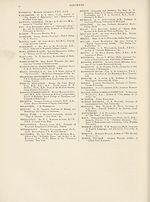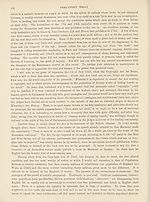New volumes of the Encyclopædia Britannica > Volume 30, K-MOR
(11) [Page vii] - Prefatory essay
Download files
Complete book:
Individual page:
Thumbnail gallery: Grid view | List view
![(11) [Page vii] - Prefatory essay](https://deriv.nls.uk/dcn17/1935/6764/193567646.17.jpg)
PREFATORY ESSAY
MODERN CONDITIONS OF LITERARY PRODUCTION.
By Augustine Birrell, K.C.
ITERATURE in its widest sense is as large as human life, and has been produced after some fashion
.A J or another at all times and in all places, though happily not yet ab omnibus. Before pens and ink
were invented men had found means to commentate upon their environment, and to record their history
“ with quipo-threads, with feather-pictures, with wampum-belts, still oftener with earth-mounds and monu¬
mental stone-heaps, whether as pyramid or cairn.” But the conditions under which literature has been
produced have ever been changeable, and still continue to change; and being subjected as they are to all
the influences that mould society and alter manners, any history of them that aimed at completeness
would resolve itself into a record of that vast, mysterious, fascinating, perplexing movement, which is
sometimes called Progress, sometimes Evolution, and sometimes Destiny.
The purpose of this essay is more modest, namely, to call attention to a few of the more obvious
changes that have occurred in the last half of the 19th century in the production and distribution of
printed matter. Error lies in wait at the portals of the humblest Inquiry, eager to take the outspread
hands of the anxious inquirer, and personally to conduct him by the pleasant paths of Hasty Generaliza¬
tion to the resting-place of False Conclusions. As we step cautiously into the arena of the book market,
our ears are deafened with the roar of its Niagara, its tremendous output, and straightway are excited
within us feelings of amazement, admiration, or dismay. The newspapers of a single week, piled one on
the top of another, would make a decent hill in a flat country, whilst monthly magazines issue forth in
crowds. The spread of what Goethe shudderingly called “ half culture ” is noticeable everywhere. Even
polite learning has not wholly escaped the taint of trade. Parnassus is undoubtedly a very noisy mountain,
where publishers shout their wares, and authors seek to gain popularity by the doubtful device of exhibit¬
ing their photographs. A commercial spirit pervades the atmosphere. And no wonder! Fortunes
stockbrokers might envy await the few who can succeed in winning and retaining, though it be but a
short while, the ear of some or other of the “ publics,” into which the book-readers of the world are divided.
There it is, the great restless, swaying crowTd, peopling whole continents, waiting to be amused, to be
excited, to be inflamed, to be taken out of themselves; who would not reach it, teach it,—tax it, if he
could ? That very risible farce, Charley s Aunt, has made more money than is represented by the
united fortunes of Scott, Thackeray, and Dickens. Had there been American copyright a generation
earlier, the clever authoress of East Lynne, or her publishers, must have drawn at least £50,000 from
trans-Atlantic readers. It is a pleasant thing, let critics say what they may, to spin a snug family-fortune
out of the inventions of your brain.
Considerations of this kind, however, lie merely on the surface, and though they may lend them-
MODERN CONDITIONS OF LITERARY PRODUCTION.
By Augustine Birrell, K.C.
ITERATURE in its widest sense is as large as human life, and has been produced after some fashion
.A J or another at all times and in all places, though happily not yet ab omnibus. Before pens and ink
were invented men had found means to commentate upon their environment, and to record their history
“ with quipo-threads, with feather-pictures, with wampum-belts, still oftener with earth-mounds and monu¬
mental stone-heaps, whether as pyramid or cairn.” But the conditions under which literature has been
produced have ever been changeable, and still continue to change; and being subjected as they are to all
the influences that mould society and alter manners, any history of them that aimed at completeness
would resolve itself into a record of that vast, mysterious, fascinating, perplexing movement, which is
sometimes called Progress, sometimes Evolution, and sometimes Destiny.
The purpose of this essay is more modest, namely, to call attention to a few of the more obvious
changes that have occurred in the last half of the 19th century in the production and distribution of
printed matter. Error lies in wait at the portals of the humblest Inquiry, eager to take the outspread
hands of the anxious inquirer, and personally to conduct him by the pleasant paths of Hasty Generaliza¬
tion to the resting-place of False Conclusions. As we step cautiously into the arena of the book market,
our ears are deafened with the roar of its Niagara, its tremendous output, and straightway are excited
within us feelings of amazement, admiration, or dismay. The newspapers of a single week, piled one on
the top of another, would make a decent hill in a flat country, whilst monthly magazines issue forth in
crowds. The spread of what Goethe shudderingly called “ half culture ” is noticeable everywhere. Even
polite learning has not wholly escaped the taint of trade. Parnassus is undoubtedly a very noisy mountain,
where publishers shout their wares, and authors seek to gain popularity by the doubtful device of exhibit¬
ing their photographs. A commercial spirit pervades the atmosphere. And no wonder! Fortunes
stockbrokers might envy await the few who can succeed in winning and retaining, though it be but a
short while, the ear of some or other of the “ publics,” into which the book-readers of the world are divided.
There it is, the great restless, swaying crowTd, peopling whole continents, waiting to be amused, to be
excited, to be inflamed, to be taken out of themselves; who would not reach it, teach it,—tax it, if he
could ? That very risible farce, Charley s Aunt, has made more money than is represented by the
united fortunes of Scott, Thackeray, and Dickens. Had there been American copyright a generation
earlier, the clever authoress of East Lynne, or her publishers, must have drawn at least £50,000 from
trans-Atlantic readers. It is a pleasant thing, let critics say what they may, to spin a snug family-fortune
out of the inventions of your brain.
Considerations of this kind, however, lie merely on the surface, and though they may lend them-
Set display mode to:
![]() Universal Viewer |
Universal Viewer | ![]() Mirador |
Large image | Transcription
Mirador |
Large image | Transcription
Images and transcriptions on this page, including medium image downloads, may be used under the Creative Commons Attribution 4.0 International Licence unless otherwise stated. ![]()
| Encyclopaedia Britannica > New volumes of the Encyclopædia Britannica > Volume 30, K-MOR > (11) [Page vii] - Prefatory essay |
|---|
| Permanent URL | https://digital.nls.uk/193567644 |
|---|
| Attribution and copyright: |
|
|---|---|
| Shelfmark | EB.18 |
|---|---|
| Description | Ten editions of 'Encyclopaedia Britannica', issued from 1768-1903, in 231 volumes. Originally issued in 100 weekly parts (3 volumes) between 1768 and 1771 by publishers: Colin Macfarquhar and Andrew Bell (Edinburgh); editor: William Smellie: engraver: Andrew Bell. Expanded editions in the 19th century featured more volumes and contributions from leading experts in their fields. Managed and published in Edinburgh up to the 9th edition (25 volumes, from 1875-1889); the 10th edition (1902-1903) re-issued the 9th edition, with 11 supplementary volumes. |
|---|---|
| Additional NLS resources: |
|

